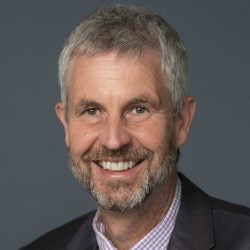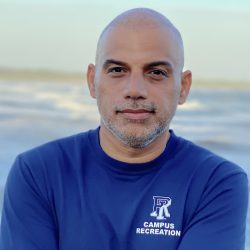With the first U.S. offshore wind farm just miles away from campus, URI is on the international forefront of oceanographic research and the development of renewable energy technology.
Engineering faculty have helped create a successful model for regulating coastal waters for uses such as renewable energy. Our research teams are developing linear electric generators that convert the motion of waves to electricity using smart circuits to capture the electricity and store it efficiently. New solar energy technologies on the horizon–panels that can be embedded in asphalt–would allow utility companies to turn highways into power plants.
Connecting all the dots requires coordinated research to build the nation’s “smart grid” backed by computers that can react in milliseconds to a sudden loss or spike in demand and manage electricity usage.
 URI and Rhode Island Energy, a PPL company, partnering to propel research on renewable energy, energy alternatives, sustainability - University of Rhode Island President Marc Parlange and Greg Cornett, president of Rhode Island Energy, Friday announced a strategic partnership that will propel important research in renewable energy, energy alternatives, and sustainability.
URI and Rhode Island Energy, a PPL company, partnering to propel research on renewable energy, energy alternatives, sustainability - University of Rhode Island President Marc Parlange and Greg Cornett, president of Rhode Island Energy, Friday announced a strategic partnership that will propel important research in renewable energy, energy alternatives, and sustainability. Cross-Disciplinary URI Team Forms Neuro-Learning Center - A URI team featuring Engineering Professor Kunal Mankodiya will establish a Neuro-Learning Center that will include cutting-edge equipment to study the relationship between brain activity and behavior, brain mapping, and neuroplasticity.
Cross-Disciplinary URI Team Forms Neuro-Learning Center - A URI team featuring Engineering Professor Kunal Mankodiya will establish a Neuro-Learning Center that will include cutting-edge equipment to study the relationship between brain activity and behavior, brain mapping, and neuroplasticity. COE Welcomes New Faculty - Mehrshad Amini, Assistant Professor, CVE/OCE Dr. Mehrshad Amini will join the University of Rhode Island in Fall 2023 as an Assistant Professor with a joint appointment in the Department of Civil and Environmental Engineering and the Department of Ocean Engineering. He completed his Ph.D. in Civil and Environmental Engineering at Pennsylvania State University in 2021. […]
COE Welcomes New Faculty - Mehrshad Amini, Assistant Professor, CVE/OCE Dr. Mehrshad Amini will join the University of Rhode Island in Fall 2023 as an Assistant Professor with a joint appointment in the Department of Civil and Environmental Engineering and the Department of Ocean Engineering. He completed his Ph.D. in Civil and Environmental Engineering at Pennsylvania State University in 2021. […]
Faculty
Professor (Courtesy Appointment)
Civil and Environmental Engineering and Geosciences
401.874.7053
tboving@uri.edu
Professor & Associate Dean of Research
Civil and Environmental Engineering
401.874.2784
craver@uri.edu
Today, the energy we produce is sufficient but if the country is to grow we need a mix of energies that are affordable, economical, sustainable and not harmful to the environment.
Distinguished Engineering Professor Bahram Nassersharif











